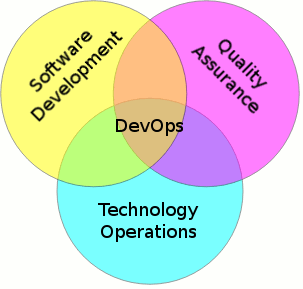What is this 'DevOps'?

The computer industry is famous for creating lingo, acronyms and buzzwords. So much so that there are even boardroom games like Buzzword Bingo. When new terminology comes along we have to sort out where it fits.
 Wikipedia shows DevOps as the intersection of development (software engineering), technology
operations and quality assurance (QA).
Wikipedia shows DevOps as the intersection of development (software engineering), technology
operations and quality assurance (QA).
There's not really one definition, and certainly not one that people can agree on but there are some common themes and ideas. DevOps comes from a place of improving IT's ability to deliver services. It emphasizes communication, collaboration and integration between developers and operations as opposed to the (all too familliar) silos that only work together because they have to. Developers and Operations naturally depend on each other, but because they are often funded from different budgets (Capex vs. Opex) they don't work as closely as they often should.
DevOps has to be a cultural change before anything else. It certainly doesn't mean that you can send all the Operations folks home and that the Developers need to pick up the QA role in addition to their own. If the rest of the organization isn't playing by the same rules, emotions run hot and toes get stepped on.
Companies that are able to implement DevOps best practices are able to deliver better software more often. Deploying updates up to 30 times more often than the competition and have higher success rates. The biggest shift in a DevOps shop is the attitude that there is only one team. One team that includes all the roles: developers, QA, DBAs, BAs, operations engineers etc.
Better collaboration among these roles yields many benefits.
Technical benefits:
- Continuous delivery
- Less complex problems to fix
- Faster resolution of problems
Business benefits:
- Faster delivery of features
- More stable operating environments
- More time available to add value (rather than fix/maintain)
Having worked both sides of the fence, we'll work with every client to integrate with existing teams or work to create an environment that suits the organization or the individual project.
Mark Voorberg

Co-Founder
Mark has been doing database design and building custom software for over twenty years. With a background in electronics, he quickly moved into software development and has been building database software solutions ever since, on many projects of all sizes.